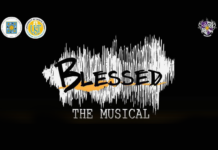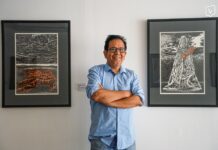“WHY ARE lives in the West seem shallower than those in the Middle East where the stakes for success are lower?”
Trying to find an answer to this question, writer-director David Hare left Europe for a journey to Israel.
Via Dolorosa, a monologue performed by Bart Guingona for Actor’s Actors Incorporated, was the account of Hare’s travels and remarkable conversations with politicians, artists, historians, and settlers in Israel. Its Philippine premiere was held last July 5 at the Carlos P. Romulo Theater, RCBC Plaza, Makati City.
Hare in the person of Guingona, feels weird about being on stage because he is a playwright, not an actor. He feels he should have been at home studying. Driven by the need of expressing his insights, he plunges into the limelight, wearing white long-sleeved shirt and faded denim jeans, telling his eye-opening trip to Israel.
Hare talks to friends who have written about Israel before leaving for the Middle East. David Grossman, a novelist, tells him that when the Jews seized Israel, they began to see the Bible not as a historical story but as a contemporary operations manual.
Hare finds Tel Aviv, his first destination, as hedonistic, much like a sophisticated Western city. In the nearby port of Jaffa, Hare discusses theater with Eran Daniel, the co-producer of the famous Romeo and Juliet where the Capulets are Palestinians and the Montagues are Jews. But Hare becomes more interested in the story of an actress who gave up acting for religion.
After meeting the Jewish settlers and the Muslim Palestinians, Hare decides to direct his attention to Christianity, his own religion. He walks through Via Dolorosa (the way of suffering), the path where Jesus Christ walked to His death. Passing through the alleys gives him a tangible sense that something has been lost. It becomes evident to him that every detail is disputed. It is not even clear on which stone Christ was crucified, but then Hare takes a deep leap of faith and kisses the ground.
His tour ends at Yad Vashem where he interviews a lawyer. The pessimistic Israeli says that Jews have been brainwashed to believe that they will always be victims, and victims can do no wrong.
What Hare calls the most important section of the play is when he returns to Britain and faces his own Via Dolorosa.
Via Dolorosa is a meaningful account of the playwright’s experiences and personal conversations. It makes the audience believe that what they hear are voices of at least 30 people, with different arguments, biases, viewpoints, and colors of understanding.
However, some parts of the monologue seem uninteresting as when Hare tells something without giving a background, leaving the audience clueless.
Guingona kept the audience interested for two hours. He gave power to words coming from ordinary people like an Israeli girl: “The Lord promised us the land, but never promised it was going to be easy. You may not be religious, but actually you need deep reserves of faith.”
In some parts of the world, nobody believes in anything anymore. But in Israel, people give meaning to their lives by struggling and fighting for what they believe is right.













